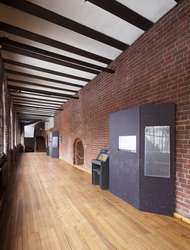Permanent exhibition
Nicolaus Copernicus was the most distinguished resident of the Olsztyn Castle. Here, he performed the duties of an administrator of the Warmia Cathedral Chapter’s shared estates. He resided twice at the Olsztyn Castle. The first time, when he held the 3-year term of the administrator, from the 8th of November 1516 to the 9th of November 1519. The second period of Copernicus's stay in Olsztyn was associated with the last war against the Teutonic Order. After Frombork was plundered by the Teutonic Knights, Copernicus sought refuge at the Olsztyn Castle and, afterwards, administered the estates of the chapter in the period from the 23rd of January 1520 to the end of October 1521.
The administrator's duties included management of the cathedral chapter’s estates in the Olsztyn and Melzak (Pieniężno) districts. In these areas, the administrator managed land, served as judicial authority and was responsible for tax affairs. This activity is very well evidenced by Locations of Deserted Fiefs (Locationes mansorum desertorum) – a document certifying assumption of land belonging to the chapter by peasants who held such land in fief.
While in Olsztyn, Copernicus devoted his time to administrative duties, making an inventory of the chapter's archive, and working on the first edition of the On the Minting of Coin treaty which resulted in the formulation of the principle that "Bad money drives out good". Also here, behind the walls of the Olsztyn Castle, he wrote the text of the first book of "De revolutionibus…" – the work of his life that "stopped the Sun and moved the Earth".
The administrator's duties included management of the cathedral chapter’s estates in the Olsztyn and Melzak (Pieniężno) districts. In these areas, the administrator managed land, served as judicial authority and was responsible for tax affairs. This activity is very well evidenced by Locations of Deserted Fiefs (Locationes mansorum desertorum) – a document certifying assumption of land belonging to the chapter by peasants who held such land in fief.
While in Olsztyn, Copernicus devoted his time to administrative duties, making an inventory of the chapter's archive, and working on the first edition of the On the Minting of Coin treaty which resulted in the formulation of the principle that "Bad money drives out good". Also here, behind the walls of the Olsztyn Castle, he wrote the text of the first book of "De revolutionibus…" – the work of his life that "stopped the Sun and moved the Earth".







